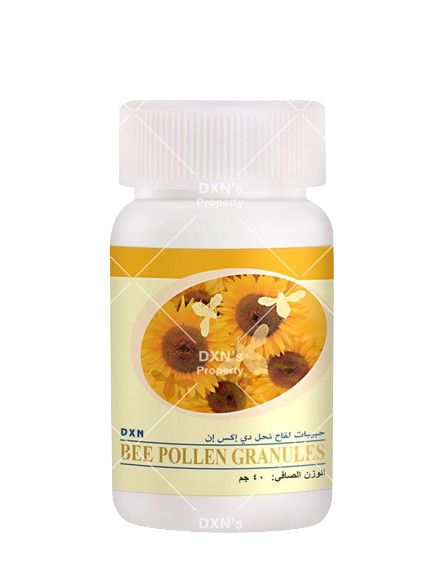 Bee Pollen
Bee Pollen
Benefits of bee pollen
Pollen contains some nutrients, including: Proteins, amino acids, carbohydrates, fats, fatty acids, phenolic compounds, enzymes, and coenzymes, in addition to vitamins as well, all of which are mentioned and explained as follows:
* Carbohydrates: Digestible carbohydrates constitute 30.8% of the components of pollen, in addition to some sugars, such as: glucose and fructose, whose percentage in pollen grains is approximately 25.7%. It is worth noting that carbohydrates are broken down in the body into glucose. It is transmitted from the bloodstream to the body's cells by the hormone insulin, and it also helps the body's cells perform their function.
* Proteins and amino acids: The protein provided by pollen grains is necessary for the growth of the body’s cells, but the amount of raw protein available in pollen grains varies depending on the types of pollen grains. The amount of protein ranges between 6%-30% of the total dry weight of pollen, and protein consists of a series of amino acids. About 10 of these acids are necessary for making honey bees. It is worth noting that proteins are the basic building blocks in the body, and every cell contains them.
* Fats and fatty acids: The amount of fat in pollen grains ranges from 1% to 10%. The fat content of pollen grains also varies, and its chemical composition varies depending on the plant source from which it is taken, according to a laboratory study published in the journal Food Technology & Biotechnology in 2016, which compared showed the content of fatty acids in pollen in samples of bee pollen, and it was shown that the content of fatty acids in this pollen is very important for honeybees, and that unsaturated fatty acids, or PUFAs for short, are necessary to maintain the health and growth of the body, and these acids are necessary for nourishing Human too.
* Vitamins: Pollen is an important source of vitamins, as the percentage of fat-soluble vitamins in it is approximately 0.1%, such as: provitamin A, vitamin E, and vitamin D, in addition to 0.6% of the water-soluble vitamins in it, such as: B vitamins. (Vitamin B1, Vitamin B2, Vitamin B6, Vitamin B5, Vitamin B3, Vitamin B7, Vitamin B9), in addition to Vitamin C.
* Fiber: Every 100 grams of bee pollen contains 14.5 grams of dietary fiber. It is worth noting that fiber plays a major role in maintaining the health of the digestive system. Especially colon cells, they also contribute to maintaining the regularity of bowel movements to facilitate the excretion of nutrients through the digestive system.
* Reducing the pain associated with the menstrual cycle: According to a study published in the journal Current Therapeutic Research in 2002, the aim was to evaluate the effect of consuming a product containing pollen extract, pistil extract, and royal jelly on menstrual symptoms. Its consumption has been shown to be associated with reducing the symptoms of premenstrual syndrome and reducing the risk of harmful or unwanted side effects.
* Increased appetite: A study published in the journal Bee Product Science in 2016 was conducted on twenty patients suffering from anemia, in which adults consumed a teaspoon of pure bee pollen or a mixture containing a spoonful of bee bread with a spoonful of honey for up to a month, while the For one-year-old children, a third of a teaspoon, and half a teaspoon for children older than one year, three times a day. The results indicated an improvement in the patients’ appetite, in addition to a decrease in their symptoms of dizziness and fatigue.
* Reducing the risk of hay fever: Despite some long-standing common claims that consuming a small amount of pollen can reduce allergies in the case of hay fever or allergic rhinitis, it has recently been noted that pollen has an anti-allergic effect. And for hay fever, according to a review published in the Journal of ApiProduct and ApiMedical Science in 2010, by using a compound prepared from different types of pollen called Pollysat, which in turn reduces the symptoms of hay fever.
* Reducing the risk of colitis: According to a laboratory study published in the journal Biomedicine & Pharmacotherapy in 2019, it was noted that pollen may have an effect that reduces colitis in its early stages.
